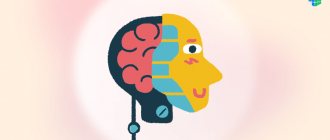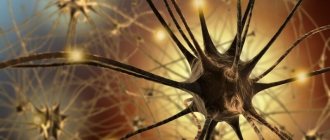Over the past 20 years, scientists have made breakthroughs in the study of how the brain works. So, it is likely that your school knowledge is seriously outdated. For example, the benefits of meditation have been scientifically proven, “pumping up” the brain is quite possible, and you can live even with one hemisphere. About this and much more in the book “Neurofitness”.
Its author, Rahul Jandial, is a neurosurgeon and associate professor at the Californian clinical research center City of Hope. In each chapter, he debunks myths about the brain, shares discoveries in neuroscience, and offers exercises to help maintain cognitive abilities for years to come.
We share insights from the book.
We have become smarter
In 1984, scientist James Flynn found that the average IQ was rising gradually—by about three points every decade. He studied IQ test scores from the early 20th century and found that the 1920s average would be considered mental retardation today, while today's run-of-the-mill scores in the early 20th century would be close to genius levels.
Flynn is confident that people have really become wiser thanks to the fact that they began to eat well from childhood and suffer less from disease. In addition, the level of school education has increased, and access to information has become easier.
The Flynn effect demonstrates that humanity as a whole is getting smarter, and the power of intelligence depends not only on DNA.
How memory works
Not long ago, it was believed that the brain did not have individual cells to store specific memories. But in 2005, scientists were able to establish that specific neurons are responsible for recognizing relevant objects. So, one specific neuron responded to a photo of Jennifer Aniston, but a completely different one responded to a photo of Halle Berry.
Since then, scientists have developed methods that can implant false memories into the brains of mice, as in the Christopher Nolan film Inception.
When we need to remember something, the brain searches for the desired cell not randomly, but in a specific area. This method is called “restricted area search.” For example, if we are asked to list as many animals as possible, then most likely we will start with domestic ones and only after exhausting this category will we move on to wild ones.
The study found that people with high IQs can remember more animals than those with lower IQs - but only because they are able to find more categories for mental search.
You can try a similar experiment for yourself. Set a timer for two minutes and write down as many names of creatures that live in water as possible. Ready? Now do the same, but rely on the categories: freshwater fish, marine fish, marine mammals, predatory fish, sea creatures with a shell. Most likely, in the second case you will be able to name many more animals. For the brain, searching in a limited area is much more effective than in vague categories.
Use this method when you need to remember any long list.
Physical activity
Physical activity is the key to good health. It also helps increase intellectual abilities and expands the brain's potential, allowing a person to become much more intelligent. To do this, it is enough to regularly load yourself physically.
What physical activity is effective:
- Walking. Regular walks are very beneficial for your health and brain. It is best to walk outdoors in the evening or during the day when the sun is shining brightly. It is recommended to walk for at least half an hour.
- Yoga. The physical practice called yoga is also a type of activity. It develops cognitive skills and opens up new boundaries for a person, making it possible to further expand their potential.
- Aerobic exercise. Performing aerobic exercise has a direct effect on the hippocampus, which helps develop intellectual abilities, opening up new possibilities.
- Power training. It is recommended to exercise in the gym with the generally accepted regularity, because... this stimulates the protection of brain neurons, which has a positive effect on intelligence.
- Golf. Anyone who wants to maintain their physical condition or develop their intellect should play golf. Before hitting the ball, you need to calculate its strength, angle of inclination, and also calculate the trajectory of its flight. It is these factors that become the main argument in unlocking potential.
There is no need to limit yourself to this list. You can choose other sports or active dances based on personal preferences.
The brain works much better if pleasant music is played during training.
Foreign language as a protection against dementia
Learning a foreign language from childhood creates a powerful cognitive reserve that will allow the brain to function effectively throughout life.
“Neurons that are constantly engaged are usually healthy and thriving, as opposed to idle neurons that wither and wither when they are not required to perform tasks,” warns the book’s author.
Here's how foreign languages affect the brain:
- Attention improves. Moving from one adverb to another develops the ability to maintain concentration.
- Learning ability increases. Children who learn a foreign language show better results in other subjects.
- Prevention of dementia. A number of studies show that people who speak only one foreign language develop symptoms of dementia about four years later than those who speak only their native language.
Rest
Many people believe that you need to work as hard as possible. But this opinion is wrong. The quality of rest is no less important for unlocking your potential. You need to not only allow yourself to relax, but also choose the right hobbies. This is the only way to achieve results.
How to Easily Increase Brain Potential Through Rest:
- Good dream. You need to sleep about 8 hours a day, and this should be done at night. This will remove all harmful substances from the body, as well as stimulate the brain to increased activity.
- Sunlight. Exposure to sunlight fills the body with vitamin D, increases activity and productivity, and improves mood. It is recommended to spend more time indoors exposed to sunlight.
- Trips. Travel to other cities or countries should be made every year. They stimulate the brain with new places and beautiful landscapes. A change of environment is always beneficial for a person.
- Writing stories. You need to come up with several main events that happened in future history. Based on them, it will be easy to write your first short story. You can simply write a short story without any prior thought to the plot. This will have a positive effect on intelligence, imagination, and memory.
- Refusal of intellectual “garbage”. You should completely stop visiting useless resources on the Internet and randomly reading articles that have no meaning. You just need to leave a few main sites where you can occasionally go and read new information.
- Games. Video games that focus on thinking a lot or special mental mini-games are very effective in expanding the brain's potential. You can use them both on a computer and on a smartphone. You can also use classic crosswords, puzzles and other puzzles.
- Meditation. Regular meditation helps the brain relax and prepare for future work and new information. This practice needs to be done every day to achieve maximum results.
When raising potential using such methods, a person will also receive other beneficial effects on his brain and body. Therefore, it is recommended to use several of them at once to achieve the best results.
Dolphins and humans have similar levels of intelligence and brain power, and their comparison has become a subject of interest to many scientists.
Unleashing creativity
There is a well-known myth about creativity: a person’s creative potential depends on which hemisphere is dominant. But in reality this statement is not supported by anything.
Programmers and artists use both hemispheres equally. In order for “creativity to arise,” the author of the book writes, it is necessary for all parts of the brain to work harmoniously. It is in the consistency between these areas that the secret of creativity lies.
In order for the brain to build connections, it needs to “put together” the necessary information. Rahul Jandial shares his method.
- The evening before surgery, he carefully examines the patient's brain scans.
- Before going to bed, he mentally scrolls through these images in all projections.
- In the morning he looks at the pictures again for a few minutes.
This is how the image of the surgical field where the surgeon will act is firmly imprinted into his brain.
Additionally, two evenings a week before bed, Jandial reads scientific articles on his topic. Gradually, the brain discovers additional connections between already known data and finds something new.
Moments of creative insight often occur between sleep and wakefulness—when we are almost asleep or almost awake. This is a special state of the brain in which you can “open the doors to the creative potential hidden in the subconscious.”
Courses on the topic:
Sales
Public performance
Dmitry Buzovsky, Public speaking expert with 14 years of experience
PowerPoint
Magic PowerPoint
Alexander Kucheruk, Ex-product marketer at Microsoft
But there are other ways to awaken creative energy.
Exercise 1. Let your mind wander
A wandering mind stimulates creative imagination. The further our thoughts wander, the more clearly connections between distant parts of the brain are visible in MRI studies.
Spend time without external stimuli in the form of gadgets or conversations - let your thoughts freely jump from one to another, allow yourself to be bored or fantasize.
Exercise 2. Get out into nature
Contact with nature stimulates creativity. This was proven by an experiment by psychologist David Strayer. He asked two groups of participants to take a creativity test. One completed it before a 4-6-day backpacking trip, the other - after. The results of the second group were 50% better.
To spur creativity, you don't have to go on a week-long trip, just a short walk. For example, Einstein walked to work to the university and back every day - 2.5 km one way.
Relationship
- Conversations. "Hi, how are you?" – do you hate this phrase? Do you feel sorry for the time for “empty” chatter? Do you prefer to keep the dialogue strictly to the point? On the one hand, it is commendable, but on the other, even trivial conversations, “about nothing,” develop cognitive functions - speech, attention and control.
- Sex. This enjoyable activity in all respects increases the level of serotonin in the blood (“the hormone of happiness”, which, among other things, increases creativity) and the level of oxytocin (“the hormone of trust” - helps a person think in new directions and make bold decisions).
- Laughter. It, like sex, is the best cure for many diseases. If you have been engaged in intense intellectual activity for a long time, then you should not pick up a volume of Schopenhauer when you come home from work. Give your brain a break, turn on a good comedy and laugh heartily.
- Ancestors. An interesting study was published in a prestigious journal dedicated to social psychology. According to him, people who thought about their ancestors before taking tests of memory, thinking and attention scored better than those who did not remember their grandparents. It’s difficult to say how objective the scientists’ arguments are, but knowing your genealogy is definitely useful.
How do you train your brain?
Dream according to science
The next common misconception is that a person needs sleep so that the brain can rest. In fact, the brain never rests, and while we sleep, important processes take place in it. We still don’t know all the functions of sleep, but among them there are definitely:
- transformation of short-term memories into long-term ones
- clearing “mental garbage” - erasing unnecessary episodes accumulated during the day (they are literally washed out of the brain)
It is important to get enough sleep. Here are the recommendations from the US National Sleep Foundation:
But what to do if you can’t sleep? Rahul Jandial writes that his most difficult patients are those who suffer from total insomnia. Such people remain awake for weeks, and this can be fatal. But if the disorder is not so serious, the recommendations of the AASM - American Academy of Sleep Medicine - can help.
- Keep a routine. Get up and go to bed at the same time every day, including on weekends or vacations.
- Avoid caffeinated products in the afternoon. This substance is eliminated from the body in 10-12 hours.
- If you can't fall asleep within 20 minutes, get up and do something calm, but always with dim lights.
- Bed is for rest only. Not for work, watching movies or hanging out on the phone.
- Limit bright light in the evenings. Gradually reduce lighting levels after 20:00.
- Turn off gadgets at least 30 minutes before bed.
- Consider cognitive behavioral therapy (CBT). If nothing helps, then instead of taking pills, you should sign up with a CBT specialist who can deal with the problem. According to many studies, this type of therapy helps 80% of patients suffering from insomnia.
What are cognitive abilities
On the day of the beginning, read the sentence.
You read it in a split second and realized its meaning much faster. But what was happening in your brain during this time? Our eyes are just a video camera, not the most technologically advanced one these days. They capture light and turn it into a stream of signals. To process and perceive this image, you need a brain. So, you have recognized the outlines of the letters and compared them with those stored in your memory. This is how the incomprehensible icons acquired their own type, this squiggle is the letter “G”. You know this because your brain has a huge file cabinet of similar silhouettes. You can recognize the letter "G" no matter what font it is written in. And this process is called “perception”. The eyes just see the letter, but your brain has a whole business on it, it knows that this is a letter of the Slavic alphabet, that it can mean a dull and voiced sound. And so with each letter of the word.
You put the letters together into a word and perceive it, and then the entire sentence. You realize its meaning, you perceive the warning, because thinking has become involved in the process. The human brain performs work that no neural network can repeat in a split second, your brain is incredibly strong, but it cannot pick up absolutely all signals. In simple terms, it will simply “burn out.” That's why we constantly use one more ability -
attention to separate the important from the unimportant.
The abilities described: memory, perception, thinking, attention are called cognitive abilities or cognitive functions. These abilities make a person intelligent, but if physiologically all people are approximately the same, then our thinking abilities are different. Even people of the same race and age, belonging to the same family, can be very different from each other. In many ways, the development of cognitive abilities in children influences the choice of profession and the quality of adult life.
Cognitive development (from English Cognitive development) is the development of all types of mental processes, such as perception, memory, concept formation, problem solving, imagination and logic. The theory of cognitive development was developed by the Swiss philosopher and psychologist Jean Piaget.
Developing neuroplasticity
“The only thing we neurosurgeons know for sure is that every brain is capable of returning to its normal state, even after the most severe illness or injury,” writes Rahul Jandial.
All business content in a convenient format. Interviews, cases, life hacks of the corporation. world - in our telegram channel. Join us!
Neuroplasticity is the brain's ability to adapt. Including extreme conditions. This is evidenced by the experience of operations during which people had one of their hemispheres removed for medical reasons - and within a couple of years, many of the patients fully recover, especially if they undergo the procedure at an early age. One hemisphere develops all the necessary connections and takes on the functions of the two.
This shows that the brain can indeed be trained. Here are some simple ways to develop neuroplasticity:
- Develop your non-dominant hand: left if you are right-handed, and vice versa. Try to use it for everyday activities like brushing your teeth. Another good way to train your hands to work in concert, but separately, is to play a musical instrument.
- Learn a new language. This trains the neuroplasticity of the left temporal lobe. The more often you study, the more new neural connections are formed.
- Do not use the "Build a route" function. The main area of the brain in which memory is concentrated is the hippocampus, and our “internal GPS navigator” is also located there. The development of spatial orientation plays an important role in the brain.
Education
- Novelty. New, more complex activities stimulate the release of dopamine, which promotes neuronal growth. Go up the intellectual ladder. Each time, complicate the task for yourself - solve more difficult puzzles, read smart books.
- Orientation. Don't know your city or even area well? Great! From the point of view of training mental abilities. Mastering new routes develops memory, attention and other cognitive functions.
- Music playing. Musicians have a well-developed parietal lobe of the brain, which is responsible for hearing, motor and visuospatial skills. If you want to “pump up” these qualities, try learning to play some musical instrument.
- Foreign languages. Learning a second or third language improves memory, broadens your horizons, and also protects the body from Alzheimer's disease.
- Oral speech. If you say something out loud, you remember it better. Proven scientific fact.
- Positive thinking. Positive psychology experts are relentless and unanimous: think positive thoughts and you will become smarter.











